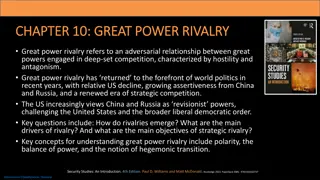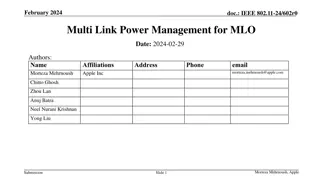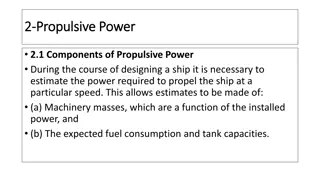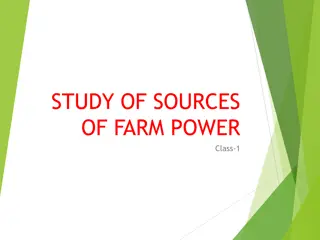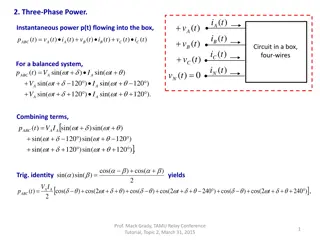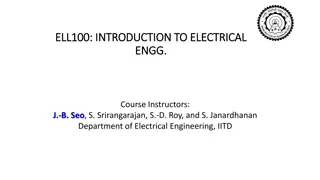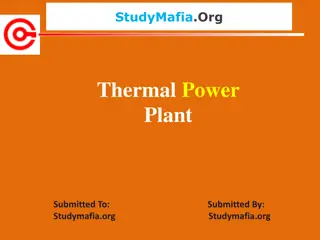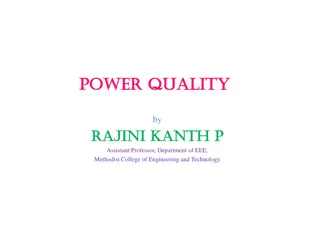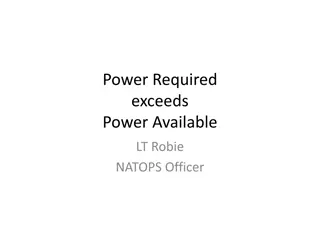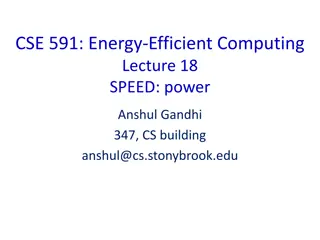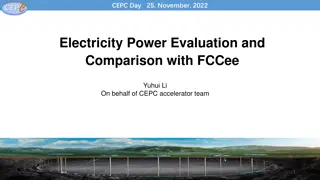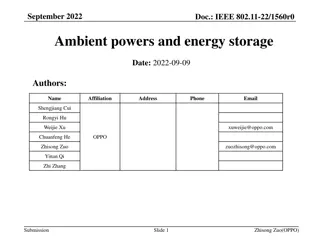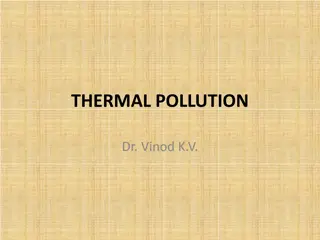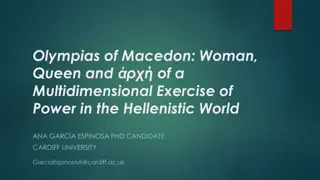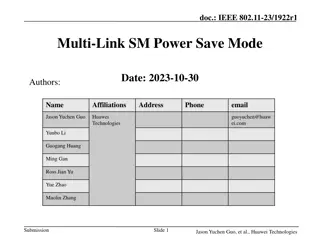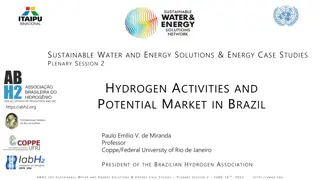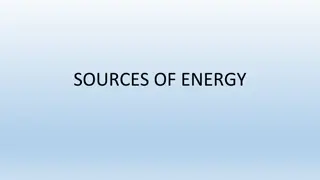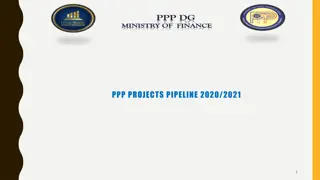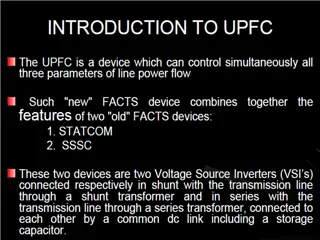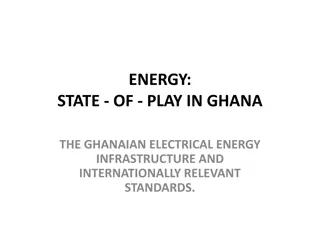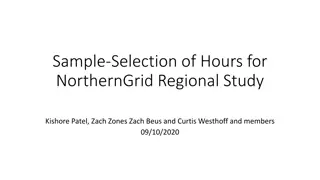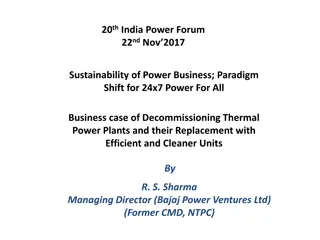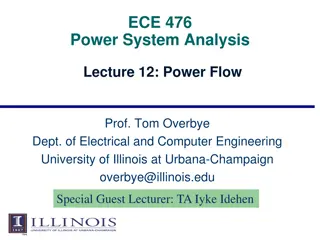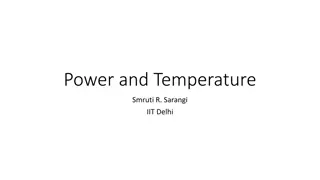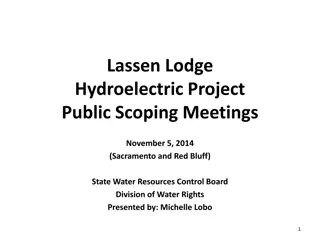Green Energy Market
Green energy also referred to as clean energy, is usually derived from natural sources that are constantly replenished. Solar energy, wind energy, hydroelectric power, biomass energy, geothermal energy, tidal energy, and wave energy are different types of renewable energy. Solar energy is the radian
6 views • 6 slides
Cisco Systems Fault Managed Power Portfolio Overview
Cisco Systems offers an industry-leading Fault Managed Power (FMP) patent portfolio comprising 24 active assets across seven INPADOC families. The portfolio includes patents supporting fault-managed power systems, PoE deployments, DC power distribution, DC-DC conversion, and HVDC connectors. The FMP
4 views • 4 slides
Power Distribution in Data Centers Overview
Power distribution and equipment play crucial roles in commercial data center infrastructure, ensuring reliable and efficient operations. Adequate power routing from the grid or generators to data center equipment is vital for stable operations, data integrity, and performance maintenance. This incl
4 views • 19 slides
Energy and Transport Development Initiatives in Africa by EU Commission
EU Commission's initiatives in Africa focus on energy and transport development through strategic corridors, flagship projects like the Lobito railway corridor, and the Africa EU Green Energy Initiative. The aim is to enhance connectivity, promote green energy generation, and improve access to elect
2 views • 8 slides
Overview of Physical Geography and Resources in Latin America
Latin America spans 7,000 miles from the U.S.-Mexico border to Tierra del Fuego and includes diverse geographic features such as the Andes Mountains, grassy plains like Llanos and Pampas, and major river systems like the Orinoco and Amazon. The region is rich in natural resources including mineral d
7 views • 21 slides
Great Power Rivalry in World Politics: Understanding Polarity, Balance of Power, and Hegemonic Transition
Great power rivalry involves deep competition and hostility between major players like the US, China, and Russia. The concept is explored through polarity, balance of power, and hegemonic transition theories, discussing power distribution, strategies, and transitions in the international system. The
4 views • 12 slides
Improving Multi-Link Power Management Efficiency in IEEE 802.11 Networks
The document discusses challenges with per-link power mode changes in multi-link scenarios in IEEE 802.11 networks, proposing a solution for more efficient power management. It addresses issues such as latency and inefficiencies in signaling for power mode changes, introducing scheduled multi-link p
6 views • 9 slides
Understanding Power Transfer and Impedance Matching in Circuits
Exploring the concept of maximizing power transfer between a source and load through impedance matching. Learn about complex conjugates, real and magnitude of complex numbers, average power in circuits, and the importance of minimizing reflected power. Discover how incident, reflected, and delivered
3 views • 33 slides
Understanding Ship Propulsion Power Estimation
In the process of ship design, it is crucial to estimate the power required for propulsion to determine machinery masses, fuel consumption, and tank capacities. Power estimates can be derived through comparisons with existing vessels or model tests, involving scaling laws for different components. S
0 views • 19 slides
Overview of Farm Power Sources and Utilization in Agriculture
Farm power sources in agriculture include human, animal, mechanical, and renewable energy. Human power is costly but versatile, while animal power is traditional and provides manure. Mechanical power from tractors and engines is efficient. India's farm power sources reflect a mix of traditional and
0 views • 12 slides
Understanding Three-Phase Power Systems and Instantaneous Power Flow
This detailed content delves into three-phase power systems, analyzing instantaneous power flow, balanced circuits, and trigonometric calculations. It explores the concept of constant three-phase power and provides insights into the analogy of a piston engine with infinite cylinders. The data includ
2 views • 9 slides
Understanding AC Power Generation and Faraday's Law in Electrical Engineering
This course introduces students to AC power generation in electrical engineering. Concepts such as magnetic flux, induction of EMF through Faraday's Law, and examples like hydroelectric turbines and gasoline motors are covered. The course aims to provide a comprehensive understanding of how electric
1 views • 40 slides
Power Transmission and Distribution Network of Tunnel Boring Machine Site
The power transmission and distribution network at the tunnel boring machine (TBM) site involves electrical motors, generators, transformers, and power cables to efficiently operate TBMs for tunnel construction. The system includes multiple generators, transformers, junction boxes, and power distrib
1 views • 7 slides
Understanding Thermal Power Plants: Overview and Operation
Thermal power plants play a crucial role in converting heat energy into electricity for various applications. This article covers the definition, layout, working principle, and components of thermal power plants, highlighting their advantages and top features. From converting heat into mechanical po
0 views • 20 slides
An Overview of Reservoir Types and Purposes
Reservoirs play a crucial role in managing water resources for various purposes like irrigation, hydroelectric power generation, flood control, and more. This article explores different types of reservoirs such as storage, flood control, retarding, and detention reservoirs, along with their function
1 views • 49 slides
Understanding Power Quality and Its Impact on Electrical Systems
Power quality refers to the characteristics of electrical power that drives sensitive equipment. It involves voltage and current deviations from ideal waveforms, impacting the efficiency and reliability of electrical systems. Various types of power quality phenomena exist, such as voltage variations
1 views • 16 slides
Overview of Electric Power Plants
Explore the functioning of various electric power plants including nuclear, fossil fuel thermal, hydroelectric, wind, solar, geothermal, biomass, and ocean power plants. Understand the processes involved in generating electricity from different energy sources such as fission, combustion, steam gener
0 views • 15 slides
Understanding Hydraulic Turbines in Fluid Mechanics and Machinery
Fluid mechanics and machinery involve the study of hydraulic turbines, which are devices that extract energy from flowing fluids. Turbines can convert the energy from pressure and velocity in fluids into mechanical energy, with different types such as steam turbines, gas turbines, and water (hydraul
0 views • 17 slides
Helicopter Power Management Guidelines
Understanding the factors that can lead to power required exceeding power available in a helicopter is crucial for safe operation. Indications such as uncommanded descent, rotor droop, loss of tail rotor authority, and right yaw signal potential issues to watch out for. Knowing when such occurrences
0 views • 11 slides
Exploring Power Efficiency in Computing Systems
In this lecture series on energy-efficient computing, various concepts related to dynamic frequency scaling, power capping, power shifting, power modeling, and power measurement are discussed. The impact of power on server speed is explored, alongside strategies for improving performance within powe
0 views • 17 slides
Comparison of Electricity Power Systems Between CEPC and FCCee
The evaluation and comparison of electricity power systems between the CEPC and FCCee accelerators reveal the power breakdowns, RF power consumption, magnet power supply, and overall power usage. Differences in power consumption for various components such as RF, magnets, and vacuum systems are high
0 views • 19 slides
Ambient Power Harvesting Technologies Overview
This document discusses various ambient power harvesting technologies such as RF energy, solar power, light, and thermal energy. RF-based energy harvesting utilizes radio waves for power transmission with potential applications in logistics, smart homes, and environmental monitoring. Solar power off
0 views • 12 slides
Understanding Thermal Pollution and Its Sources
Thermal pollution is the detrimental effect of heated effluents discharged by power plants on aquatic and terrestrial ecosystems. This pollution occurs when the temperature of water bodies rises significantly due to human activities, leading to a reduction in dissolved oxygen and impacting aquatic l
0 views • 19 slides
Power Quality Monitoring and Evaluation in Modern Energy Systems
Power quality is crucial for stable operations in energy systems. This content discusses issues in power supply, reasons for measuring power quality, consequences of bad power quality, methods for measuring power quality, and evaluation techniques for compliance reports. Tracking power quality param
0 views • 21 slides
Power Dynamics in the Hellenistic World: A Study of Olympias of Macedon
Exploration of power dynamics in the Hellenistic world through the multidimensional exercise of power by Olympias of Macedon. The study delves into various forms of power such as reward, coercive, legitimate, referent, and expert power, shedding light on their roles in shaping leadership and influen
0 views • 20 slides
Enhancing Power Efficiency in IEEE 802.11 Multi-Link SM Power Save Mode
The document discusses how Multi-Link Operation (MLO) in IEEE 802.11be can improve throughput and reduce latency but may increase power consumption for non-AP devices. It introduces the concept of Multi-Link SM Power Save mode to optimize power usage by activating multiple links only when necessary,
0 views • 10 slides
Sustainable Water and Energy Solutions: Hydrogen Activities and Market Potential in Brazil
Professor Paulo Emílio V. de Miranda discusses sustainable water and energy solutions, focusing on hydrogen activities and the potential market in Brazil. The presentation covers various renewable energy sources, such as hydroelectric power, geothermal energy, solar energy, biogas, and more. It als
0 views • 5 slides
Understanding Power Consumption in Memory-Intensive Databases
This collection of research delves into the power challenges faced by memory-intensive databases (MMDBs) and explores strategies for reducing DRAM power draw. Topics covered include the impact of hardware features on power consumption, experimental setups for analyzing power breakdown, and the effec
0 views • 13 slides
Understanding Different Sources of Energy
Exploring conventional and non-conventional sources of energy, this content discusses the characteristics of a good fuel source, such as high energy output and ease of availability. It delves into the distinction between renewable and non-renewable energy sources, highlighting fossil fuels as non-re
0 views • 22 slides
Three Gorges Dam: The Good, the Bad, and the Ugly
The Three Gorges Dam, a monumental hydroelectric project in China, presents a complex picture with its massive energy generation potential and significant social and environmental impacts. Built to address China's energy demands, the dam has impressive statistics in terms of capacity and electricity
0 views • 15 slides
Infrastructure Development Projects Overview in Ethiopia
This document provides an overview of ongoing infrastructure development projects in Ethiopia, including public-private partnership initiatives in the energy, transportation, health, and housing sectors. It covers existing projects, hydroelectric schemes, solar installations, expressways constructio
0 views • 10 slides
Overview of Unified Power Flow Controller (UPFC) in Power Systems
A Unified Power Flow Controller (UPFC) is a combination of a Static Synchronous Compensator (STATCOM) and a Static Synchronous Series Compensator (SSSC) interconnected via a common DC link. UPFC allows bidirectional flow of real power and provides concurrent real and reactive series line compensatio
0 views • 20 slides
Evolution of Electrical Infrastructure in Ghana
The historical development of Ghana's electrical energy infrastructure, initiated by the British government before Ghana's independence, led to the establishment of voltage standards and systems primarily based on fossil fuel generators. The Volta River Hydroelectric Project played a pivotal role in
0 views • 17 slides
Understanding Leadership and Power Dynamics
Power and leadership are interconnected concepts, with power being the measure of a person's ability to influence others. Leaders have power in various situations, but it does not necessarily mean having power over people. Effective leaders balance their use of power with knowledge and trust, knowin
0 views • 9 slides
Analysis of Load, Generation, and Hydro Data for NorthernGrid Regional Study
This data presents information on load, generation, and hydro aspects in the NorthernGrid regional study. It includes data for different dates and hours, showcasing trends in energy consumption, production, and hydroelectric power across various regions.
0 views • 6 slides
Exploring Environmental Awareness in LifeSmarts: Water, Air Quality, and Habitats
Delve into the world of environmental consciousness with LifeSmarts, focusing on water conservation, air quality improvements, and habitat protection. Learn about sustainable practices like reducing waste, recycling, and composting. Discover the importance of surface water, groundwater, and runoff i
0 views • 29 slides
Discussion on Sustainable Energy Solutions and Efficiency Improvements in Thermal Power Plants
The 20th India Power Forum held on 22nd November 2017 highlighted the importance of sustainability in the power business, focusing on the paradigm shift towards 24x7 power for all. Topics included decommissioning thermal power plants for more efficient and cleaner units, with insights from industry
0 views • 16 slides
Power System Analysis: Lecture on Power Flow
Lecture 12 on Power Flow Analysis in Power Systems covers the use of power balance equations when analyzing complex power consumption and generation. It explains the derivation of real power balance equations for iterative solutions in power flow analysis. The lecture highlights the need for iterati
0 views • 30 slides
Understanding Power Consumption and Temperature in Electronic Circuits
Explore the significance of power consumption in electronic circuits, focusing on reasons for high power, high temperature, and low reliability. Learn about sources of power consumption, types of power dissipation, dynamic power analysis, and the relationship between energy and power in circuits.
0 views • 30 slides
State Water Board Involvement in Lassen Lodge Hydroelectric Project
State Water Resources Control Board's Division of Water Rights, led by Michelle Lobo, presented an outline at the public scoping meetings for the Lassen Lodge Hydroelectric Project in 2014. The State Water Board's mission is to uphold California's water resources' quality and allocation for current
0 views • 20 slides





